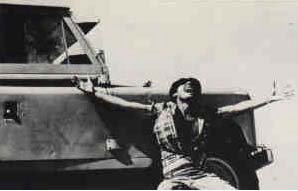
In Michelangelo Antonioni's 1975 film The Passenger, the main character, David Locke,[1] portrayed by Jack Nicholson, impulsively "trades in" his own life for that of another man who resembles him and who dies in an adjacent hotel room in Africa. Locke is attempting to escape the painful prison of his own life and enter the realms of possibility and enticing mystery represented by the life of another; in other words, he is trying to create reality from a common fantasy. He is trying to rewrite the narrative of his life, and he is hoping to "become" someone else, just as many moviegoers do vicariously while in the theater. Unfortunately he lies to himself and ignores the fact that any such trade, outside the seemingly magical environment of the cinema, is going to include the sometimes startling sensations associated not only with risk and change but with a different perspective, based on the history of the life one is stepping into; his escapism is also analogous to suicide, a rejection of one's own history and possibilities. Locke's story shows that lying to oneself by trying to live in what Jacques Lacan referred to as the Imaginary (a fantasy world) is even more perilous and self- destructive than lying to others.
READ MORE
